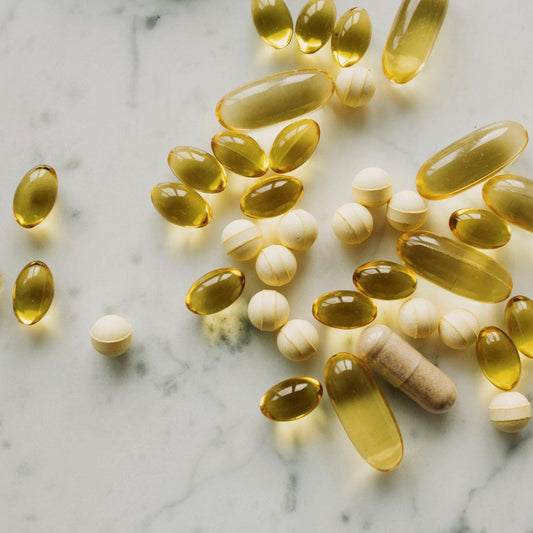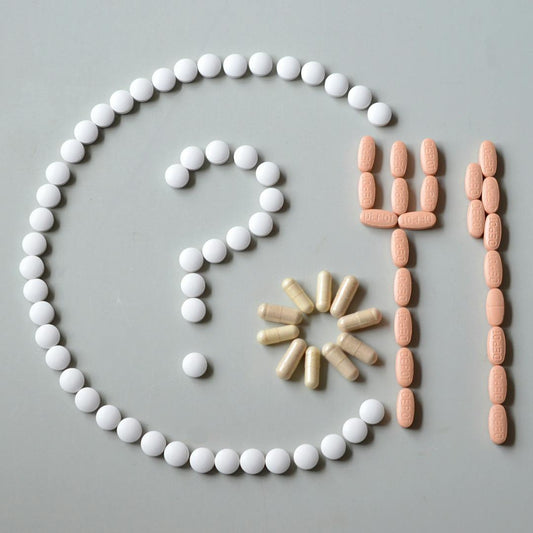
How Much Omega 3 Fish Oil Per Day Should I Take? Optimal Dosage Guidelines
How Much Omega 3 Fish Oil Per Day Should I Take? Optimal Dosage Guidelines
If you’re looking for an all-around MVP supplement that can positively impact just about every aspect of your health, fish oil is your guy! Omega 3 fish oil is an incredible addition to your wellness routine, benefiting everything from your heart health to your vision.
But, if you’re new to fish oil, it can be tricky to understand how much omega 3 fish oil per day you should be taking, especially when you break it down further into EPA, DHA, and other essential omega 3 fatty acids.
So, in this guide, we’ll explain everything relating to omega 3 fish oil dosage. Soon, you’ll be crystal clear on exactly how much fish oil you need, and we’ll even show you where you can get your hands on triple-strength omega 3 fish oil capsules to maximize this supplement’s wellness power!
Why You Should Take Omega 3 Fish Oil
Before we discuss how much omega 3 fish oil per day you need, why should you take fish oil in the first place? Let’s start with some basic background and the science behind fish oil supplements, as well as outlining the incredible health benefits fish oil can bring you.
Overview of Omega 3 Fish Oil
Omega 3 fish oil is derived from fatty fish, such as salmon, mackerel, and sardines, and is rich in essential omega 3 fatty acids, including eicosapentaenoic acid (EPA) and docosahexaenoic acid (DHA).
These fatty acids play pivotal roles in so many different physiological processes within the body, ranging from supporting heart health and brain function to reducing inflammation and enhancing your immune response.
Key Benefits
Honestly, there’s not much that fish oil can’t do. Many people take omega 3 fish oil for brain fog, as these essential healthy fats are so good for your brain. There are also omega 3 fish oil benefits for skin, including hydrating and rejuvenating properties.
The benefits of fish oil for hair include scalp hydration and hair follicle stimulation, which can lead to hair growth. And, many women embrace the benefits of fish oil during pregnancy, as it supports fetal development and reduces the risk of premature birth.
Is fish oil good for dry eyes? It sure is! Omega 3 fish oil helps to regulate inflammation, which is often the cause of dry, red, itchy eyes. Plus, it adds to the lipid layer of tears, which makes them more lubricating and less likely to dry out, further helping to treat dry eyes.
Fish oil is also incredible for heart health - it reduces your risk of heart disease and other cardiovascular events like stroke. As you can see, this little supplement really packs a punch!
Why Your Daily Dosage of Omega 3 Fish Oil Matters
It’s so important to make sure that your daily dosage of omega 3 fish oil is high enough. As you can see, this supplement brings a whole suite of benefits, and if you’re not supplementing your diet with omega 3 fatty acids, you may be missing out on them!
Our bodies don’t produce omega 3 fatty acids on their own, so we either need to get them from the foods we eat or from supplements. Plus, the ratio of omega 3 to omega 6 fatty acids in the modern Western diet is often skewed, with higher omega 6 fatty acids from sources like vegetable oils.
The best way to restore balance to this ratio is to increase your omega 3 intake, and the easiest way to do that is with omega 3 fish oil supplements. But how much omega 3 fish oil per day do you actually need? Let’s take a look.
Individual Factors Influencing the Optimal Omega 3 Fish Oil Dosage
So, how much omega 3 fish oil should I take? Well, it’s different for everyone, and there are several factors that affect your omega 3 fish oil dosage - let’s take a look at those now.
Age
Age plays a big role in determining how much omega 3 fish oil per day you should be taking. Infants and kids may require higher doses to support proper cognitive and visual development, as DHA is crucial for brain and eye health during these formative years.
Pregnant and lactating women also have increased omega 3 requirements to support fetal development and ensure optimal nutrition for their newborns. Older adults also need high levels of omega 3 intake to mitigate age-related cognitive decline and reduce the risk of cardiovascular disease.
As we age, our bodies may become less efficient at converting plant-based sources of omega-3s, such as alpha-linolenic acid (ALA), into the more bioavailable EPA and DHA. This is why finding the best omega 3 fish oil supplement becomes more important as we grow older.
Weight
Body weight can also influence the optimal dosage of omega-3 fish oil due to variations in metabolic rate, distribution of adipose tissue, and overall nutrient requirements. In general, larger people may need higher doses of omega 3 fatty acids to achieve therapeutic effects.
Those with obesity or metabolic syndrome may also have elevated levels of inflammation and oxidative stress, which means that higher doses of omega 3 fatty acids may be beneficial. If you’re not sure what’s best for you, check with your doctor before increasing your dosage.
Health Status
Your health status also affects your daily omega 3 fish oil dosage. Anyone with cardiovascular disease, inflammatory disorders, or neurodegenerative conditions may require higher doses to address these specific health concerns and find relief from symptoms.
For example, people with elevated triglyceride levels may benefit from higher doses of EPA and DHA to lower triglyceride levels and reduce the risk of cardiovascular events. Similarly, those with inflammatory conditions like rheumatoid arthritis may require higher doses to alleviate symptoms.
On the other hand, if you’re taking prescription medications or receiving medical treatment you should talk to your doctor before starting omega 3 supplementation, as interactions between omega 3 fatty acids and certain medications may occur.
Dietary Intake of Omega 3s
It makes sense that if your diet is low in EPA and DHA, your daily omega 3 fish oil dosage will need to be higher. If you don’t eat fish regularly, or you’re on a predominantly plant-based diet, you will likely need omega 3 supplements more than someone who’s regularly eating fatty fish.
How Much Omega 3 Fish Oil Per Day Should I Take, Though?
So, with all that in mind, how much omega 3 fish oil should I take? To answer that, we need to look at the actual EPA and DHA content of supplements, and how much of these essential fatty acids you need. So, how much omega 3 is in fish oil, and how much should you be getting each day?
Dosage Considerations Based on EPA and DHA Content
When selecting a fish oil supplement, you need to understand the difference between fish oil vs omega 3 and look at how much omega 3 is in your fish oil. The EPA and DHA concentrations can vary between supplements, and this will determine the overall dosage that you need to take each day.
For general health maintenance, the American Heart Association recommends consuming an absolute minimum of 250 milligrams of combined EPA and DHA per day for healthy individuals. The maximum recommended dosage is up to 4,000 mg of combined EPA and DHA.
Dosage Adjustments for Specific Health Conditions
For cardiovascular health, doses ranging from 1,000 to 4,000 milligrams of combined EPA and DHA per day have been studied for their potential to lower triglyceride levels, reduce inflammation, and prevent cardiovascular events.
Similarly, doses of 500 to 2,000 milligrams of combined EPA and DHA per day have been explored for their effects on cognitive function and mood regulation. Higher doses may be more effective in improving cognitive outcomes in older adults or people with cognitive impairments.
If you’re dealing with an inflammatory condition like rheumatoid arthritis or inflammatory bowel disease, you may benefit from higher doses of omega-3 fatty acids to modulate the inflammatory response and alleviate symptoms.
Doses ranging from 2,000 to 4,000 milligrams of combined EPA and DHA per day have been studied for their effects on inflammatory markers and ability to reduce pain and inflammation. As always, talk to your doctor if you’re not sure about your specific omega 3 fish oil dosage needs.
More Tips on Maximizing the Benefits of Omega 3 Fish Oil Beyond Dosage
Understanding your daily dosage of omega 3 fish oil is important, but it’s not the only thing you need to consider when it comes to supplementing your diet with omega 3s. Here are some other tips on maximizing the benefits of your supplements.
Optimal Timing for Taking the Supplement
When is the best time to take omega 3 fish oil? Generally, we recommend taking your omega 3 fish oil supplement in the evening, as you may absorb more of the critical EPA and DHA fatty acids.
It’s also a good idea to take your fish oil supplements with food, as some people get queasy if they take omega 3s on an empty stomach. For kids, fish oil supplements are best taken in the morning or afternoon.
Ultimately, the most important factor is consistency. Incorporating omega 3 fish oil into your daily routine, whether in the morning, afternoon, or evening, can help ensure that you receive consistent benefits over time.
How long does fish oil take to work? It depends on the specific results you’re looking for. You may notice improvements in your skin fairly quickly, while reducing inflammation or finding relief from arthritis symptoms may take longer. Stay patient and stick with your daily dosage!
The Importance of Supplement Quality
Unfortunately, there are some poor-quality supplements out there that won’t bring you any real health benefits, and may even contain harmful impurities or contaminants. Make sure you’re sticking to high-quality supplements from a brand you trust.
Wondering how to tell if your fish oil is good quality? Choose a product that undergoes third-party testing, and is made from high-quality, sustainable fish oil in the first place. Look for reviews from other buyers and make sure most people are happy with their purchase.
It’s also important to understand how is fish oil made. The best quality fish oil is molecularly distilled, as this concentrates the EPA and DHA content and removes impurities. You also don’t want any unnecessary additives or preservatives in your omega 3 fish oil supplements.
Combining Omega-3 Supplementation with Healthy Lifestyle Habits
Omega 3 supplements can bring some pretty powerful health benefits on their own, but they’re even more effective when you combine them with a few other lifestyle changes. For starters, try to eat a balanced diet rich in fruits, vegetables, whole grains, and lean proteins.
Regular physical activity is also essential for maintaining your cardiovascular health, managing weight, and reducing inflammation. Aim for at least 150 minutes of moderate-intensity exercise per week, along with strength training exercises that target major muscle groups.
Managing stress levels through relaxation techniques such as meditation, yoga, or deep breathing exercises can also have a big impact on your overall health. Chronic stress can contribute to inflammation and oxidative stress, which omega-3 fatty acids may help mitigate.
You can also combine your omega 3 intake with other supplements for a more powerful wellness boost. Try the best maca root supplement for a mood boost, or the best caffeine and l-theanine pills for sustained energy and focus without the jitters.
Start Taking Fish Oil Today By Empowering Yourself With Smarter Vitamins!
At Smarter Vitamins, we have premium, potent omega 3 fish oil 1000mg supplements. Using molecular distillation techniques, we’ve created a high-purity formula sourced from wild-caught Alaskan fish, fresh from the pristine waters of the Bering Sea.
How much omega 3 is in fish oil supplements from Smarter Vitamins? Our capsules contain 800 mg of EPA and 600 mg of DHA per capsule, along with another 100 mg of other essential omega 3s.
With third-party testing and formulation in an FDA-registered facility, our supplements are among the safest out there. Plus, we’ve added a delicious berry flavor to save you from the nasty fishy burbs that come with many fish oil supplements.
Bringing Our Guide on Omega 3 Fish Oil Dosage to a Close
So, how much omega 3 fish oil per day do you need? Ultimately, it depends on your specific health requirements and the factors we discussed earlier, like age, weight, and any health conditions you have. It also depends on the EPA and DHA content of your supplements.
Smarter Vitamins omega 3 fish oil supplements are highly concentrated, with more than 1400 mg of combined EPA and DHA per supplement. Our manufacturing techniques ensure our supplements are high purity, keeping you safe and giving you more bang for your buck.
Fish oil brings some incredible health benefits, and our supplements are the best way to experience the power of omega 3s for yourself. So, get your daily omega 3 fish oil supplements from Smarter Vitamins and unlock a healthier, happier, more vibrant you!
Get exclusive access to sales, discounts, new product launches, awesome content & more.
Once a month or so.

































